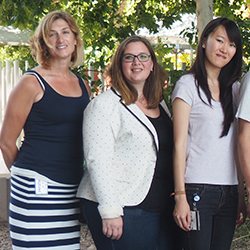Laura Hopkins, a graduate student and member of the reserch team of University of Arizona endocrinologist Janet Funk, MD, has a personal interest in the turmeric study spearheaded by Dr. Funk that is taking aim on rheumatoid arthritis.
Dr. Janet Funk is leading a clinical trial to investigate the anti-inflammatory impact of turmeric, a natural supplement and Indian spice.
It was in April 2013 that University of Arizona student Laura Hopkins was diagnosed with rheumatoid arthritis, a chronic autoimmune disease that causes the body's defense system to attack itself.
In rheumatoid arthritis, which disproportionately affects women, tissues around joints become inflamed, resulting in swelling, pain, joint destruction and disability. No known cure exists.
Hopkins' experience with the condition would lead her to seek out Janet Funk, MD (pictured left), a UA associate professor of medicine and nutritional sciences in the University of Arizona College of Medicine – Tucson. Dr. Funk, a member of the UA Division of Endocrinology, Diabetes and Metabolism, the BIO5 Institute and UA Cancer Center, is working with a team of researchers to find out if turmeric, the natural supplement and Indian spice, can block the arthritic inflammatory effects of rheumatoid arthritis.
 EXTRA INFO
EXTRA INFOThose interested in more information on the turmeric study or in participating in the clinical trial — which has been reviewed and found to be acceptable by an Institutional Review Board responsible for human subjects research at the University of Arizona — can contact Dr. Janet Funk at (520) 626-4744 or botanicals@email.arizona.edu.
Eventually, Hopkins became involved in a clinical trial Funk is currently leading to investigate the anti-inflammatory impact of turmeric. The clinical trial was approved in 2015, and enrollment for those who suffer from the disease is currently open. As a member of Funk's team, Hopkins helped design the clinical trial and she developed an electronic database for the project.
"Many others have a more severe case of RA, or are in a flare that leaves them in so much pain that they are not able to lead a full, active life," Hopkins said. "Knowing that could be me is definitely my motivation to help advance science and discover more options for RA patients."
Hopkins, who earned a Bachelor of Science in nutritional sciences from the UA in 2014 and is scheduled to complete the master's program in August, shared why she chose to engage in the research program led by Funk, whether the outcome might change her course of treatment, and her thoughts on research at the UA.
Q: How does rheumatoid arthritis affect your life?
A: RA makes you re-evaluate your priorities. The truth is, you aren't able to do everything you used to do. At least, not at the beginning or during a flare-up. So you learn to really prioritize what's important to you, and sometimes you have to miss out on things you'd like to do. It's hard to have to say no to family and friends who want you to participate in activities, and often they don't understand. You don't always "look sick" when you have this disease, so people forget. And it can be isolating because at a certain point if you say no too much, people just stop asking. So it's a really fine line between taking care of yourself, and still doing things that make you happy with people you love.
Q: What would happen if you did not receive treatment for your rheumatoid arthritis?
A: If I did not receive treatment for my RA, there would come a time when most likely I would not be able to work, and perhaps not even do what is necessary to meet my basic needs. I feel very fortunate that I was diagnosed early and have been able to manage my symptoms well compared to others I know. I have also responded well to treatment and have been able to resume almost all activities I enjoy. However, this is a progressive disease and without proper care and treatment the disease would progress to the point that there would be severe joint pain and degradation, maybe even deformation. Not to mention the severe side effects that can accompany chronic untreated inflammation, including increased risk of serious infection and heart disease.
Q: How did you become involved with Dr. Funk and the turmeric study?
A: I was introduced to Dr. Funk and her work through a Nutritional Sciences Department graduate class (520: Advanced Nutritional Sciences) where investigators from other areas of the University of Arizona are invited to speak to graduate students to highlight the impact of nutritional components in many areas of health and research. It was a great way to hear firsthand how nutrition impacts many diseases, not just general weight and health.
Q: Do you feel personally invested in this study because you are suffering from rheumatoid arthritis?
A: I do feel personally invested in this study. Whether or not turmeric is found to be beneficial for RA patients, that information will advance the knowledge of how to best treat RA patients, which will personally affect me. Right now, I rely solely on prescription medications to control my RA, and the side effects and risks are always in the back of my mind. But if I could lessen that dependence and use food/food components proven to help manage my RA, it could really change my life. And if turmeric is found not to have a profound effect on RA inflammation, then at least we know that and can look to other treatment options.
Q: How has BIO5 and the UA facilitated collaboration between yourself and Dr. Funk?
A: I feel very lucky to be a graduate student at an institution like the UA that places great importance on cross-departmental studies and collaborations. In fact, it was one of the reasons I chose to study at the UA and in the nutritional sciences graduate program. As a student, it is hard to know all of the different avenues your course of study can take you. You may enter a field thinking you will want to do one thing, but unless you can see all of the areas that discipline affects, how can you really know the impact you could have? It is evident right off the bat how important these collaborations are to BIO5, the UA and all of the researchers on campus. I think it's what sets the UA apart from other universities.
OTHER RECENT UANEWS or UA@WORK STORIES:
- “UA Study of Lung Disorders Gets $11.4M Boost” | July 18, 2016
- "UA@Work: Meet the Dean — Dr. Charles Cairns” | July 5, 2016
- “UA Researchers Closer to Preventing Asthma” | May 6, 2016


